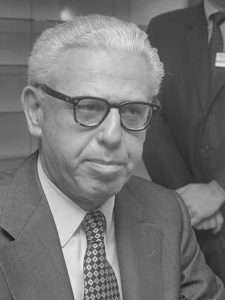The Volokh Conspiracy
Mostly law professors | Sometimes contrarian | Often libertarian | Always independent
Today in Supreme Court History: January 19, 1990
1/19/1990: Justice Arthur Goldberg dies.

Editor's Note: We invite comments and request that they be civil and on-topic. We do not moderate or assume any responsibility for comments, which are owned by the readers who post them. Comments do not represent the views of Reason.com or Reason Foundation. We reserve the right to delete any comment for any reason at any time. Comments may only be edited within 5 minutes of posting. Report abuses.
Please to post comments


Goldberg had been on the Court just shy of three years when he stepped down to become President Lyndon Johnson's UN Ambassador, and many still wonder why he did. Even in 1965, UN Ambassador wasn't exactly a particularly powerful or prestigious position.
According to Johnson in his memoirs, Goldberg had accompanied him to the funeral of UN Ambassador Adlai Stevenson, who had died of a heart attack on July 4, 1965. Johnson asked Goldberg about rumors that he was "restless" with Supreme Court work, which Goldberg confirmed. Johnson offered him the open position of Secretary of Health, Education, and Welfare, but Goldberg responded that he was more interested in foreign affairs. A few days later, Goldberg contacted Johnson to ask about the UN Ambassador position.
According to Goldberg's wife, however, it was Johnson who initiated the request that he leave the Court to become UN Ambassador. Goldberg himself would later write that he thought he could be instrumental in establishing peace in Vietnam but had overestimated his own capabilities to do so. Some have speculated that Johnson "had something" on Goldberg.
Regardless, it was well known that Johnson wished to put his old friend and confidante (and crony, some might say) Abe Fortas on the Court, which he did. Fortas himself would spend less than four years on the Court, resigning in the face of financial scandal and possible impeachment. Fortas wasn't the first political buddy of a President to be placed on the Supreme Court, but he would be the last. After the Fortas affair, the Senate would be more circumspect about such nominations (see, e.g., Harriet Miers).